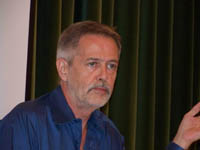Readercon 19 — Thurs. July 17th
Today has just been about the longest day I’ve had in a while. Up at 6am to finish packing the car, packing our bags, pick projects/books to take with me, and to get on the road by 9am. We also had to make sure the garden was watered, all the garbage out of the house and ready for Friday pick up, and so on and so on. Ern was riding up with us and once he arrived, it was time to hit the road. We pulled out of the drive at 9am — planning paid off.
The trip up was pretty uneventful. No accidents (lots of signs of them and signs warning of delays but I guess we actually were just after the clean up — so no problem). We made quite a few stops for coffee breaks, bathroom breaks (me), and just to stretch our legs. Remember, we’ve got about 20 tons of books packed into this Honda CRV. I’m exaggerating but it felt like 20 tons when you were trying to go uphill in traffic. With all the stops, it took us a bit longer than expected to get here to the Burlington Marriott. We’d planned on arriving at 7pm and got in about 8pm. Luckily, we still managed to get here in time to get our stuff into the Dealer’s Room — though we’ll get set up tomorrow. We’re just too tired.
But lo, there is programming tonight. We’re too late for Opening Ceremonies but by the time we check in and get our bags to our room (and boy that bed looks comfy), we just have time to get to a 9pm talk/discussion.
9PM Every Critic His Own Aristotle: The Languages of Writers, Critics, Academics, and Fans. Gary K. Wolfe with discussion by John Clute, F. Brett Cox, Paul Di Filippo, et al. Talk/Discussion (60 min.). Writers of SF and fantasy criticism feel free to invent their own terminology in addition to that traditionally used in mainstream literary studies. And this new terminology has seldom been portable among the multiple communities that talk about SF–writers, reviewers (both inside and outside the field), academics (ditto), and fans (including fan scholars). Wolfe will discuss the communities and their relationships to one another. Is there hope for developing a coherent dialogue among these groups, and eventually a unified language?
I’d read this discussion/talk description on the website and really wanted to go to this one. I’m so glad we made it. I just wish I was brain-lagged by 13 hours in a car on the highway. I took notes. Now that I’m in our room writing this post and looking at my notes, I’m finding them similar to those wonderfully intelligent and creative notes that one makes with the pen and paper by the bedside when you awake in the wee hours with a brilliant insight. I have no clue what these hen-scratching were meant to convey — but never fear I’ll try my best to dredge up something (but this is from my faulty brain and you all should have been here because this talk/discussion was brilliant).
 Wolfe led off talking about the gazillion of definitions of science fiction that are out there. He’s broken them down into three types: functional definitions, rhetorical definitions, and theoretical definitions. Under functional he mentioned David Hartwell’s definition in the Year’s Best… that (paraphrase here) science fiction is what a chronic reader would recognize as science fiction.
Wolfe led off talking about the gazillion of definitions of science fiction that are out there. He’s broken them down into three types: functional definitions, rhetorical definitions, and theoretical definitions. Under functional he mentioned David Hartwell’s definition in the Year’s Best… that (paraphrase here) science fiction is what a chronic reader would recognize as science fiction.
It seems that all definitions work if they make the continuing discussion of science fiction easier because it gives a frame of reference in which to determine what is in and what is out. There was also a discussion of definitions, classifications, and context. Terms were mentioned that I hope to look up later and learn more about such as: thought experiments as opposed to extrapolations (some extrapolations are not SF), cognitive estrangement (there was a lot of agreement that this term was going to be a very useful one) — this is where my notes become incoherent….
Basically, it is believed (by me if no one else) that we need a nomenclature that is common for discussion. It seems that academics do not often cite non-academic papers and thus the work done by reviewers and fans may have covered the field and made some significant progress in developing a common language but that academics (unless they are also fans or reviewers or critics) may not be aware of it. Many of the audience cited the problem of researchers being discouraged from looking at sources outside academic journals.
 Since several of the people in the audience and officially in the discussion have an academic background the topic was interesting because of their belief that a common language for discussion would benefit the genre as a whole.
Since several of the people in the audience and officially in the discussion have an academic background the topic was interesting because of their belief that a common language for discussion would benefit the genre as a whole.
It’s my belief that if there is a common nomenclature for discussion and for placing works within the context of the genre, then it may be easier to discuss the text and how well it fulfills it promise or contract with the reader, the fan, and/or critic.




